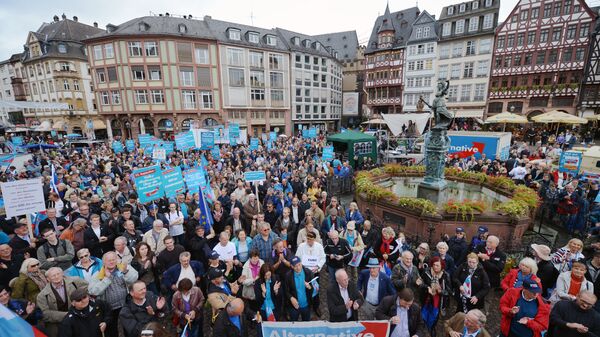The recent success of the Alternative for Germany (AfD) party in the Bundestag election as well as Donald Trumps' victory last year have shown that not only low-middle class people support right-wing ideologies; representatives of other social strata do as well, including white-collar workers, the middle class and young people in their twenties.
Germany: Alternative for Germany (AfD)
A recent study published by the German newspaper Die Zeit revealed that AfD supporters represent different social groups, including workers, families with high incomes and even academics.
"The AFD's widespread support isn't particularly surprising or unique. Far-right populism has always been dependent on a fragile coalition of voters — wealthy professionals, disaffected workers, and extremists — to break out of the margins and succeed," Quartz wrote.
The research stated that what united the AfD voters was their criticism of Angela Merkel's so-called open-door policy toward refugees.
France: Front National (FN)
Marine Le Pen, the leader of the right-wing party, appealed to young people by debating traditional left-wing topics, such as the welfare of the state for French citizens and women's rights.
The latter topic led to the fact that Le Pen was supported by numerous women as well. A research conducted by French polling institute Ifop revealed that women made up 48 percent of the voters who had backed the party.
United States: Donald Trump
According to Quartz, women also played a crucial role in the US presidential election.
"While women did vote overwhelmingly for Hillary Clinton, white women did not. Overall, 52 percent of white women voted to elect Donald Trump. That figure jumps to 62 percent when looking at non-college-educated women," the web portal wrote.
The US president was also supported by wealthy Americans. According to a survey, a third of his supporters earned between $50,000 to $100,000 and another third had a salary of $100,000 or more.
Thus, the idea that right-wing populism is popular only among representatives of the working class disappointed with their living conditions seems to be wrong.
"Yes, angry, working class men disillusioned by globalization have supported right-wing populism. But so did the hipsters, the soccer moms and well-to-do suburbanites, highlighting the deep chasms in societies across the Western world," Quartz concluded.




